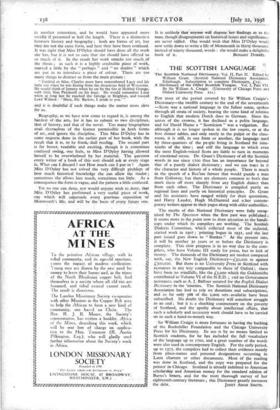• THE SCOTTISH LANGUAGE
The Scottish -National Dktionary.-Vol. II, Part II. ' Edited by William Grant. (Scottish National Dictionary Association, Edinburgh. Subscription to complete Dictionary, L15).
A Dictionary of the Older Scottish Tongue. Vol. I, Part VII. By Sir William A. Craigie. (University of Chicago Press and Oxford University Press. zis.)
FOR most of the period covered by Sir William Craigie's Dictionary—the twelfth century to the end of the seventeenth —Scots was a national language in the fullest sense, spoken through all strata of society; bearing the same kind of relation to English that modern Dutch does to German. Since the union of the crowns, it has declined as a polite -language, and for DaVid Hume a " Scotticism " was a vulgarism. But although it is no longer spoken in the law courts, or at the best dinner tables, and only rarely in the pulpit or the class- -room, it is still, in one form or another; the language .used by three-quarters of the people living in Scotland for nine- tenths of the time ; and still the language to which even the most English-voiced Scots are liable to turn in moments of emotional stress: ' Dr. Grant's Dictionary of all the Scottish words in use since 1700 thus has an importance far beyond that of a purely dialect- dictionary ; and we can trace in it the character and history of a whole people. There is much in the speech of a Buelan farmer that would puzzle a man from Galloway, but there are elements common to both that mark them off more sharply from any English dialect than from each . Other. The Dictionary is compiled partly on regional lines and partly on historical principles. Dr. Grant
and his assistants have ranged widely for their quotations, and Harry Lauder, Hugh McDiarmid and other contem- porary writers appear in their pages along with older authorities.
The merits of this National Dictionary were fully recog- nised by - The Spectator- when -the -first part was published ; it seems more to the point now to draw attention to the handi- Caps under which its compilers are working. The Scottish
Dialecti Committee, c011eeted. most of the material, started Work in 1907 ; -printing' began in 1931„ and the last part issued goes down- to `! Bunker." At the present rite, it will be another 3o years or so before the DictiOnary is Complete. This- slow progress is in no way -due to the com- pilers, who have Volume III ready for press, but to laCk of Money. The demands of the Dictionary are modest compared with, say, the New English Dictionary—J30,000 as against ‘300,000. But there -is no University Press in Sccitland with resources in any way comparable to those of -Oxfcird ; there have been no windfalls, like the £5,000 which the .Goidsmiths contributed to Volimie VI of the N.E.D. ; and no Government assistance, such as A. J. -Balfour secured for the English- Dialect Dictionary in the 'nineties. The Scottish National-Dietionary Association has had to rely on .donations. and subscriptiOns, and so • far only '566 of the 2,000 a-sets .available have been subscribed. No „doubt. the Diction. ry will somehow struggle to an end ; but it is .a shocking commentary on the poverty of Scotland, and the apathy about intellectual :affairs, that such a scholarly and necessary work should haVe to be -carried (Min such a hand-to-mouth way.
Sir William .Craigie is.more fortunate irr having the baCking of the Rockefeller Foundation and the Chicago University Press for his Dictionary. Its use is by no means limited to Scottish students, for he has included the full: Vocabulary of the language up to 1700, and a great number of the words were also used in contemporary English. For the early period, up to 1375, the compilers had to collect their evidence mainly from place-names and personal designations occurring in Latin charters or other documents. Most of the reading was done in Scotland, and - the- copy - was prepared for the
printer in Chicago.- Scotland is alreadY indebted to American scholarship and American money for the standard edition of Burns's letters, and for the most thorough survey of her eighteenth-century literature ; this Dictionary greatly increases











































 Previous page
Previous page